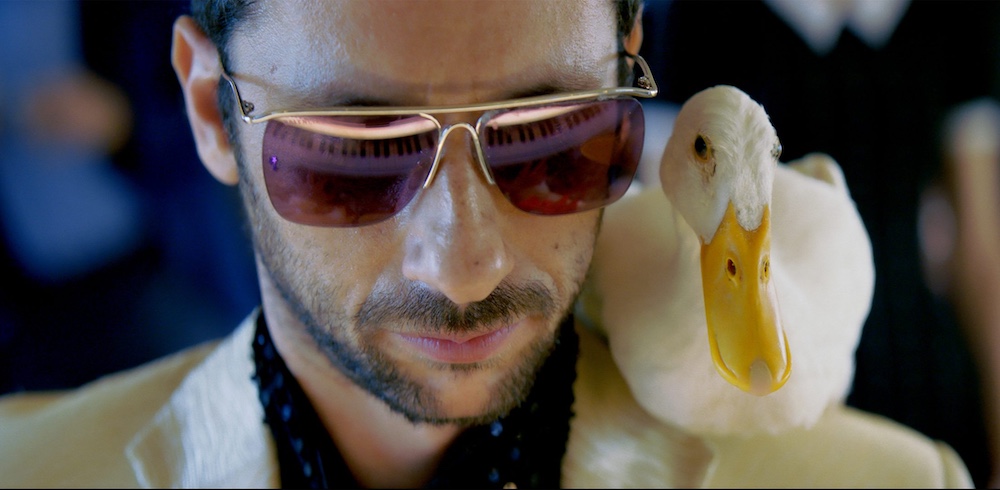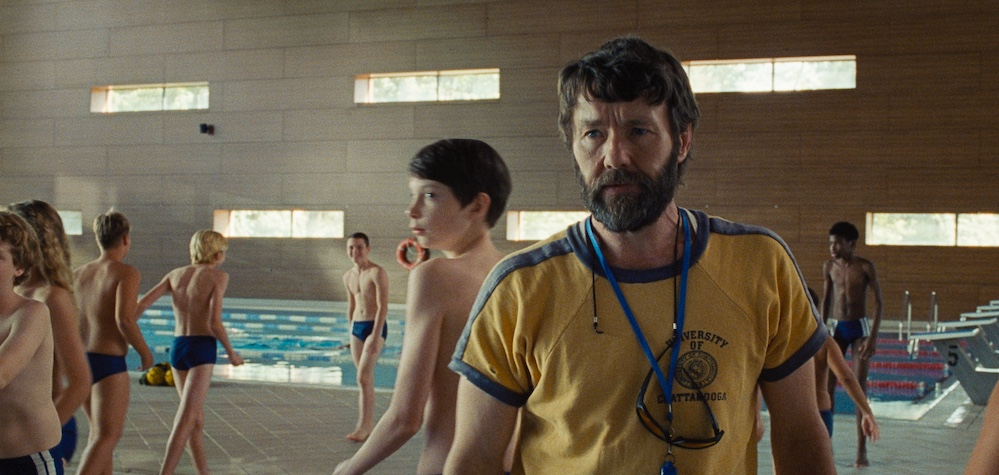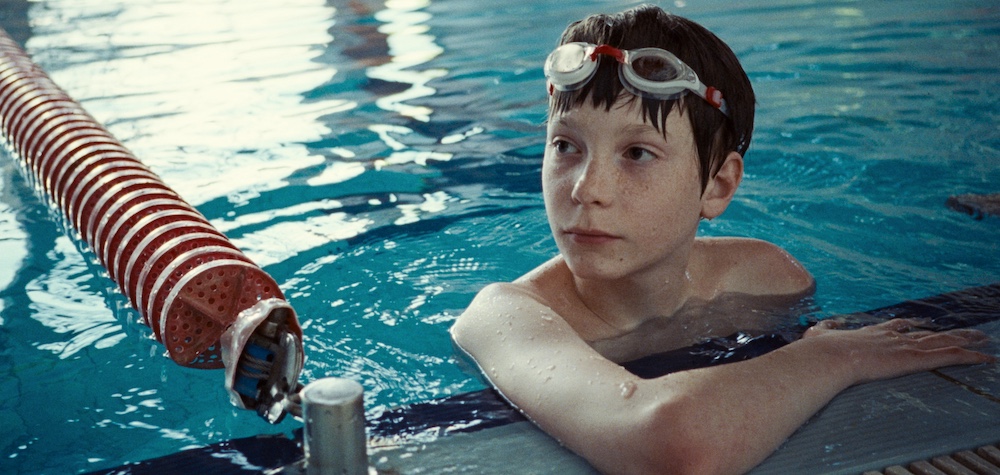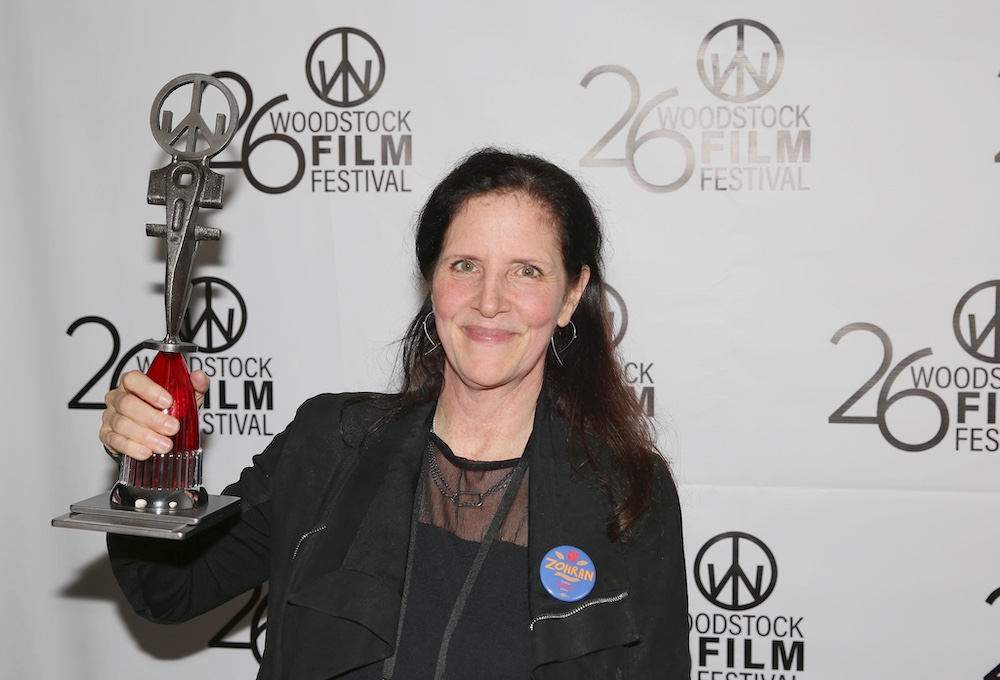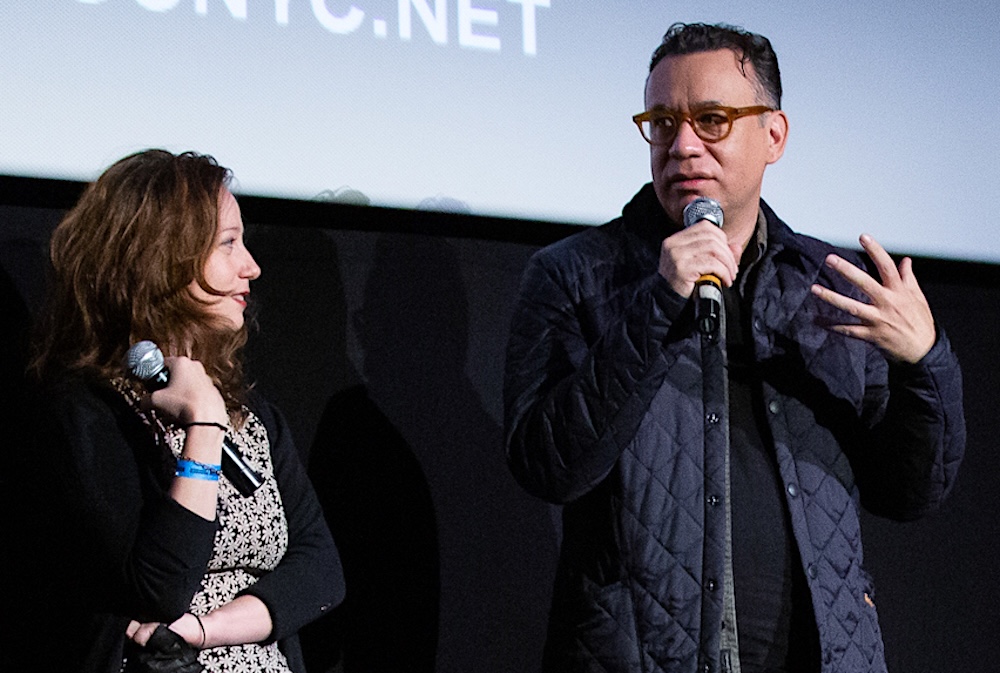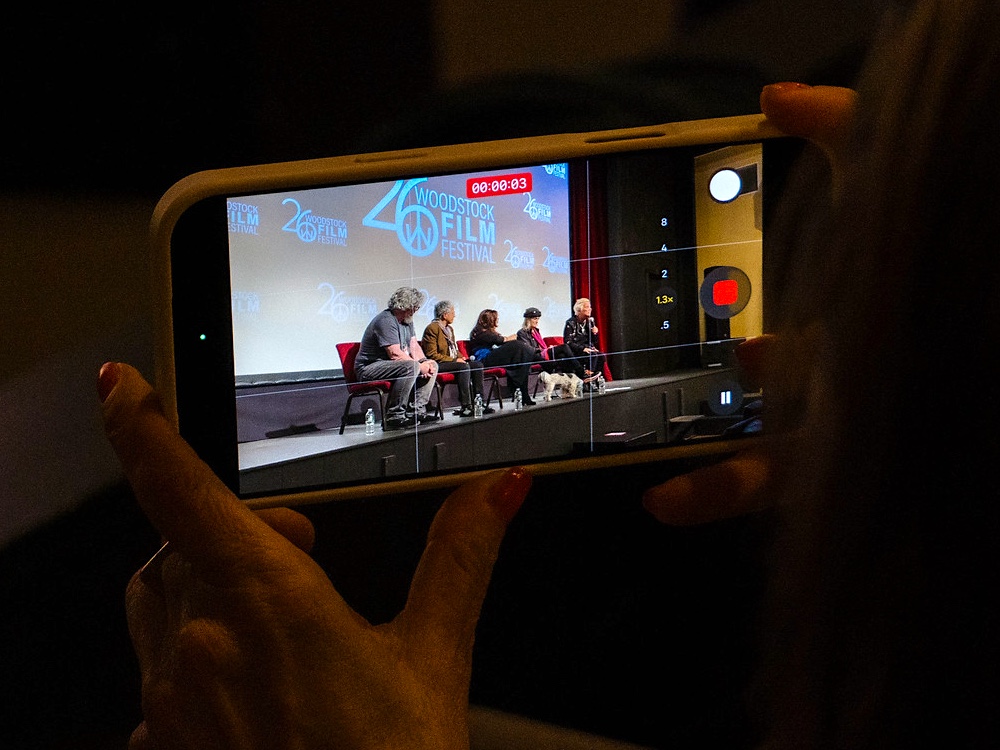
Truth-Tellers: Among the Moviemakers at the Woodstock Film Festival
It’s a bright fall Saturday afternoon, and the Woodstock Film Festival is in full swing. The streets of the town are teeming with people, most of whom have come here for the four-day festival of cinema, now in its 26th year.
There’s also a contingent of demonstrators taking part in the national “No Kings” protests. Somehow, the backdrop of activism seems apt for this year’s festival, where WFF’s programming choices haven’t shied away from the political realities of our current moment.

Photo by Paul Willis
There is, Yes, the provocative new movie from the Israeli auteur Nadav Lapid that confronts his country’s response to the October 7 attacks. There are films about protest movements in India, about the battle for reproductive rights in the US, and about the long confinement of a Native American activist.
There are also two films celebrating the work of crusading journalists. One, Steal This Story, Please! follows the career of the Democracy Now! host Amy Goodman. While the second, Cover-Up, charts the seminal reporting done by the Pulitzer Prize–winning investigative journalist Seymour Hersh, and is co-directed by the Oscar-winning documentarian Laura Poitras.
Poitras’ own work exposing the crimes of the powerful will be feted at the festival’s awards ceremony later the same day, where she will receive an award for her contribution to free speech.
The Ark
But nurturing new talent is just as important to the lifeblood of the festival as celebrating established filmmakers, so on this Saturday morning, I am meeting with Jeremy Chilnick, a New York City-based moviemaker, whose directorial debut, The Ark, premieres at the festival. Over coffee at Woodstock’s Garden Cafe, Chilnick lays out the importance of events like this in providing a launch pad for new movies.
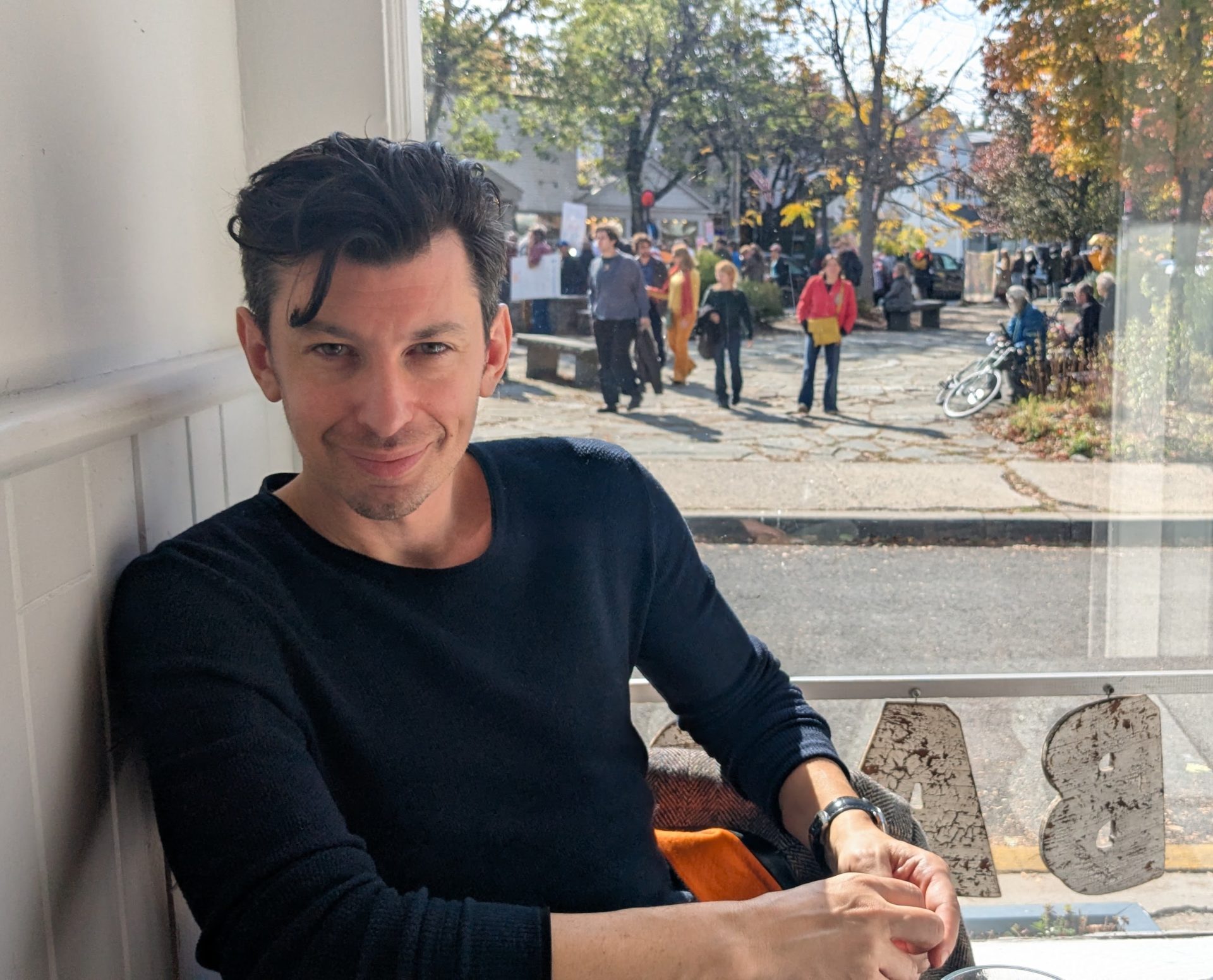
Director Jeremy Chilnick of the film The Ark | Photo by Paul Willis

The Ark Directed by Jeremy Chilnick
“There’s so much content out there that the competition to actually get your movie seen feels higher than it’s ever been,” says Chilnick. “So it’s a pretty huge deal to be able to say that programmers who the rest of the film industry has respect for have said that your film can play here.”
The Ark is a heartfelt documentary following the lives of Zhenya and Anatoly Pilipenko, a Ukrainian couple who run an animal sanctuary taking care of animals abandoned during the country’s ongoing conflict with Russia.
Chilnick, who made the film with the Ukrainian director Viacheslav Rakovskyi, says he hopes it can “build bridges of empathy.” He says, “Hopefully you get to understand somebody else’s life, and to walk in their shoes.”
Yes
One person whose shoes I don’t especially feel like walking in is Y, the protagonist of Yes, the incendiary new movie from Israeli film director Nadav Lapid. In the film, Y (played by Ariel Bronz) is a struggling musician who, alongside his girlfriend Yasmine (played by Efrat Dor), panders to the whims of a decadent ruling elite, including penning the music to a new national anthem extolling the virtues of Israel’s violent campaign in Gaza.

Nadav Lapid, director of Yes, at the Woodstock Film Festival
- Yes | Directed by Nadav Lapid | Film by Losange
- Yes | Directed by Nadav Lapid | Film by Losange
The world Y inhabits is an absurdist nightmare where the characters lose themselves in debauchery and self-indulgence as a way to distract from the horrors they are complicit in. The film, which has been compared to Jonathon Glazer’s The Zone of Interest, was inspired by a trip Lapid made to his homeland (he now lives in France) in the aftermath of the Hamas terrorist attacks.
Lapid tells an audience at a Kingston screening Saturday evening that he was struck by two opposing moods in the country at the time. The first, he says, was a kind of collective agony.
“I felt it too,” says Lapid, whose previous feature Synonyms won the Golden Bear at the Berlin Film Festival. “And there is a kind of tenderness in agony, so there was suddenly something tender in Israel, which is not a very tender place.”
“On the other hand, talking to friends, and listening to people in the streets and to politicians, it was evident that we were heading towards the worst, most apocalyptic vengeance.” Lapid thought at first of making a documentary but decided that “a reconstitution of reality wasn’t the way to get to the truth.”
“I felt that the only way to respond to the madness of reality was by calling in the madness of cinema,” says Lapid, who is joined at the screening by lead actress Dor. Yes is indeed quite mad; a dizzying, discordant experience, a vision of a kind of collective nervous breakdown in which you are led to understand that the possibility of peace is as remote for the perpetrator as it is for the victim.
The Plague
Another film that explores the victim-perpetrator dynamic is The Plague, which took home the festival’s top prize for best narrative feature, as well as an honor for best editing. I caught up with the film’s director, Charlie Polinger, in the aftermath of his win.
“It was really exciting to win these awards,” says Polinger. “It definitely feels great to be honored in this way.”
The Plague tells the story of a group of adolescent boys taking part in a water polo camp, and is a visceral exploration of the emotional and physical turbulence of puberty, and how it can spiral into cruelty when left unchecked.

The Plague | Directed by Charlie Polinger | Film by Independent Film Company
- The Plague | Directed by Charlie Polinger | Film by Independent Film Company
- The Plague | Directed by Charlie Polinger | Film by Independent Film Company
Polinger says the genesis for the story came during an enforced stay at his parents’ home during the COVID-19 lockdown. He found himself in his childhood bedroom reading teenage diaries of his experiences at various boys’ summer camps.
“It just sort of struck me that there was something really unique here, and a different kind of exploration of boyhood than I had seen portrayed,” says Polinger. “I was already interested in this world of boys’ polo – the discomfort with your body, this sense of trying to stay afloat. Even the rules of the game – the ref technically can’t call anything that happens below the water’s surface – felt like a rich metaphor for the social dynamics among the boys.”
The film, which stars Joel Edgerton and premiered at Cannes earlier this year, is notable for the stand-out performances of its young cast, in particular Kayo Martin, who plays the ringleader of the boys, Jake. In the film, Jake’s control of the group relies on slyness and charm rather than physical threat, and as you watch him operate, you are reminded of how some of the scapegoating going on at a societal level today deflects from its own bad conscience with a kind of perverse humor.
“It’s a really common thing,” says Polinger. “This gaslighting where you can always excuse yourself by saying, ‘I was just joking.’”
While this was Polinger’s first visit to the festival, its proximity to his base of New York City lent it a familiar feel. “Much of the film community I work with lives Upstate, so I had a lot of friends who came to the screenings,” he says. “The festival is part of the larger East Coast film community.”
As I move between screenings, I cast my eye about for signs of this community. It is not easy to find, and not only because of the presence of so many protesters. It is also because film people, at least the ones who come to Woodstock, aren’t that conspicuous. You spot them here and there, of course – serious types sporting baseball caps and designer glasses. But, unlike the goals of the medium they work in, for the most part, they don’t stand out.
Cover-Up
I spot Laura Poitras only because I have been forewarned of her presence. I met her at a Q&A following a screening of her latest movie, Cover-Up, at Upstate Films in Saugerties on Saturday afternoon.
As I drive into Saugerties –as in Woodstock– the streets are massed with protesters holding placards. Part of me wants to join them, feeling that to disappear into the quiet of an auditorium at such a moment is a kind of evasion. Yet there is nothing evasive about Poitras’ film, which she co-directed with filmmaker Mark Obenhaus, and which tackles head-on the horrific consequences of US militarism. At one point near the end of the film, Seymour Hersh notes candidly: “We are a culture of enormous violence.”
It is a violence that Hersh has refused to countenance, and in his six decades of journalism, he has been responsible for bringing to the world’s attention the US military cover-ups of its mass killings at My Lai during the Vietnam War, and of its torture and abuse of inmates at Abu Ghraib prison during the Iraq War.
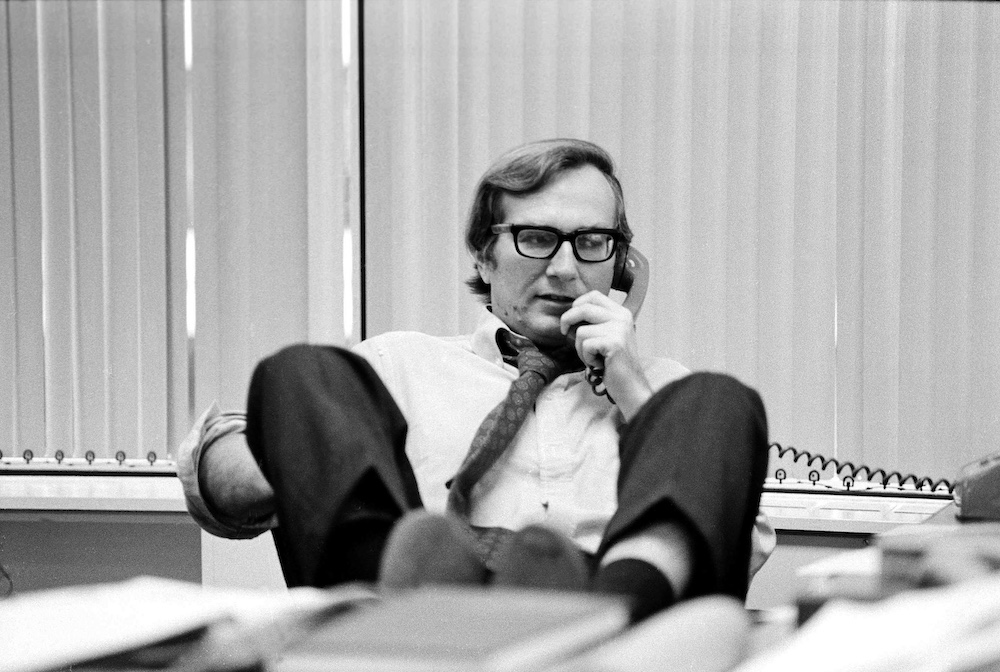
Seymour Hersh in Cover-Up | Film by Netflix
- Director Laura Poitras of Cover Up | Film by Netflix
- Director Laura Poitras accepting “Freedom of Speech” Award
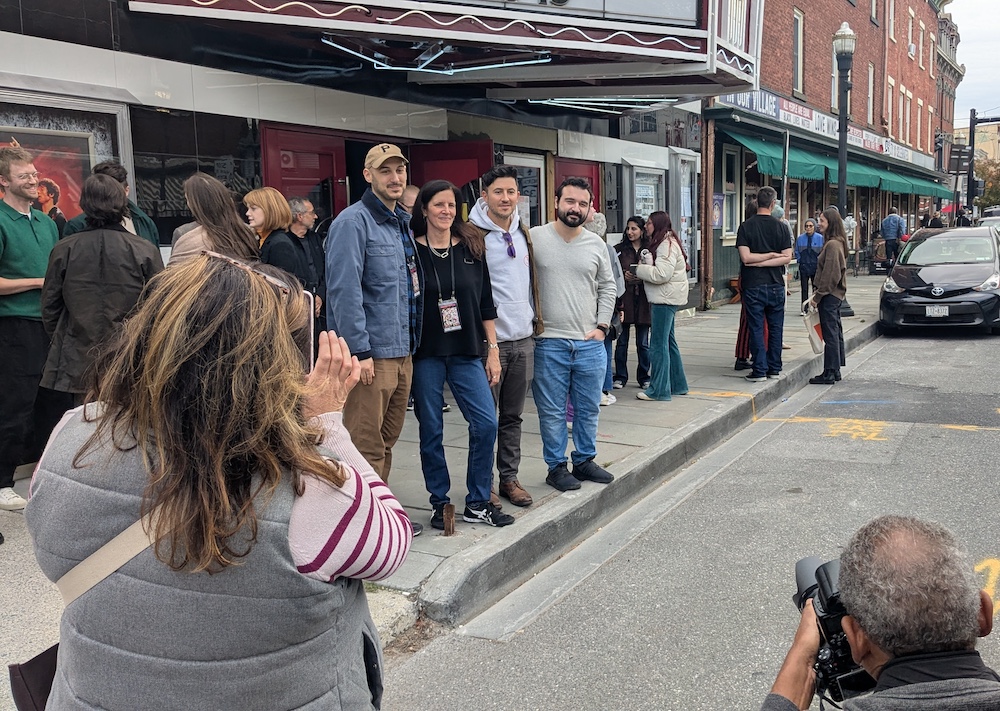
Cover-Up Film | Photo by Paul Willis
Poitras tells the audience in Saugerties that she first asked Hersh if she could make a film about him 20 years ago. It was 2005, and she had just returned from Iraq, where she had completed filming My Country, My Country, her documentary about the US occupation.
Poitras, who won an Oscar for her film Citizenfour about the US whistleblower Edward Snowden, says she was “in total despair about what was happening with the [US] press… Nobody was asking hard questions except for very few journalists, and the most respected being Sy Hersh.”
Alongside the visual retrospective of Hersh’s career, the film also shows the veteran reporter still at work now, talking on the phone to an anonymous source who is providing him with evidence of atrocities committed by Israeli troops in Gaza.
Listening to the source lay out the intimate brutalities of this latest episode of state murder, it is easy to feel despair about the ongoing cycles of violence in the world. The antidote to this despair, says Poitras, is the example of Hersh himself. “He’s 88 and he’s still doing it, and I think that’s the answer…we have to continue to expose the truth and do the work,” she says.

Photos courtesy of Paul Willis + Woodstock Film Festival
An INSIDE+OUT featured story by Paul Willis @pwillyart
Follow/Connect with Woodstock Film Festival via Website | YouTube | Facebook | Instagram | Inside+Out Spotlight
+ + +
About the Woodstock Film Festival

The 26th Annual Woodstock Film Festival presented a slate of distinguished films from October 15 to October 19, 2025, at venues across the Hudson Valley towns of Woodstock, Rosendale, Kingston, and Saugerties.
Founded in 2000, the Woodstock Film Festival (WFF) is a not-for-profit 501(c)(3) organization that nurtures and supports emerging and established filmmakers. WFF provides innovative mentoring and inspired educational programs benefitting filmmakers, students and diverse audiences while serving as a powerful cultural and economic engine for New York’s Hudson Valley and beyond. Such efforts have consistently resulted in the festival being hailed as one of the top regional film festivals worldwide.
+ + +
Now in its 26th year, 2025 promises to be as exciting as ever.
Click HERE for this past year’s full lineup of films
Write a Comment
You must be logged in to post a comment.



